英语口语常用名词
十大名词英语
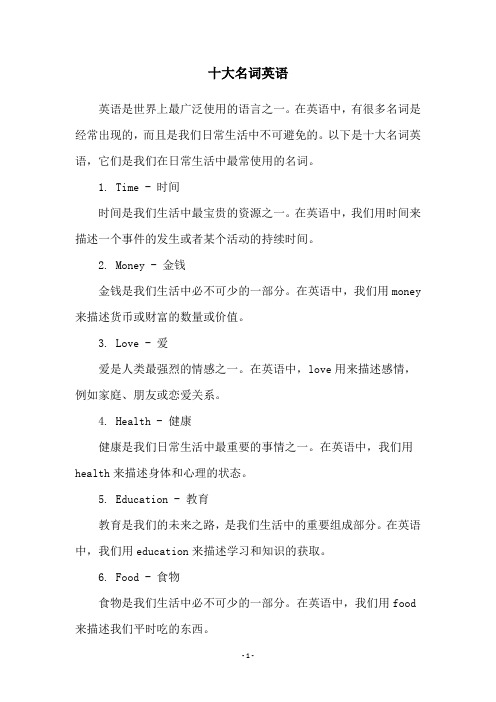
十大名词英语英语是世界上最广泛使用的语言之一。
在英语中,有很多名词是经常出现的,而且是我们日常生活中不可避免的。
以下是十大名词英语,它们是我们在日常生活中最常使用的名词。
1. Time - 时间时间是我们生活中最宝贵的资源之一。
在英语中,我们用时间来描述一个事件的发生或者某个活动的持续时间。
2. Money - 金钱金钱是我们生活中必不可少的一部分。
在英语中,我们用money 来描述货币或财富的数量或价值。
3. Love - 爱爱是人类最强烈的情感之一。
在英语中,love用来描述感情,例如家庭、朋友或恋爱关系。
4. Health - 健康健康是我们日常生活中最重要的事情之一。
在英语中,我们用health来描述身体和心理的状态。
5. Education - 教育教育是我们的未来之路,是我们生活中的重要组成部分。
在英语中,我们用education来描述学习和知识的获取。
6. Food - 食物食物是我们生活中必不可少的一部分。
在英语中,我们用food 来描述我们平时吃的东西。
7. Work - 工作工作是我们生活中必不可少的一部分,它带来了我们的收入、成就感和社交关系。
在英语中,我们用work来描述我们所做的工作。
8. Travel - 旅行旅行是我们生活中的一种享受和冒险。
在英语中,我们用travel 来描述我们去旅游或出差的经历。
9. Family - 家庭家庭是我们生活中最重要的一部分。
在英语中,我们用family 来描述亲属关系和家庭成员。
10. Friendship - 友谊友谊是我们生活中最重要的一部分,它让我们感到快乐、支持和安慰。
在英语中,我们用friendship来描述我们与朋友之间的关系。
名词英语单词大全100个
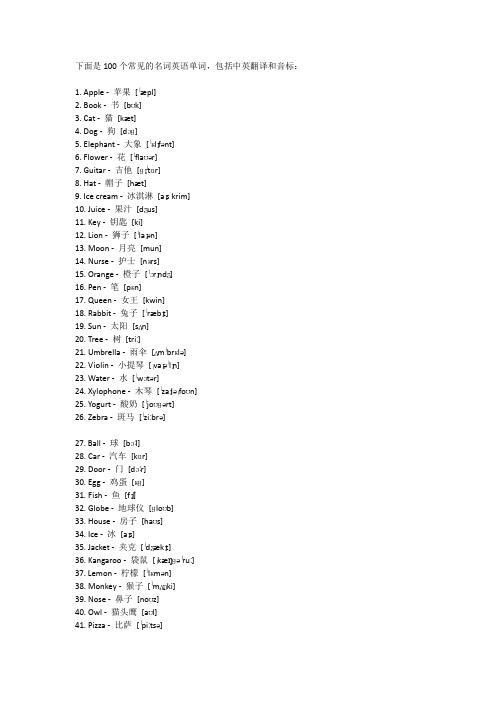
下面是100个常见的名词英语单词,包括中英翻译和音标:1. Apple - 苹果[ˈæpl]2. Book - 书[bʊk]3. Cat - 猫[kæt]4. Dog - 狗[dɔɡ]5. Elephant - 大象[ˈɛlɪfənt]6. Flower - 花[ˈflaʊər]7. Guitar - 吉他[ɡɪˈtɑr]8. Hat - 帽子[hæt]9. Ice cream - 冰淇淋[aɪs krim]10. Juice - 果汁[dʒus]11. Key - 钥匙[ki]12. Lion - 狮子[ˈlaɪən]13. Moon - 月亮[mun]14. Nurse - 护士[nɜrs]15. Orange - 橙子[ˈɔrɪndʒ]16. Pen - 笔[pɛn]17. Queen - 女王[kwin]18. Rabbit - 兔子[ˈræbɪt]19. Sun - 太阳[sʌn]20. Tree - 树[triː]21. Umbrella - 雨伞[ʌmˈbrɛlə]22. Violin - 小提琴[ˌvaɪəˈlɪn]23. Water - 水[ˈwɔtər]24. Xylophone - 木琴[ˈzaɪləˌfoʊn]25. Yogurt - 酸奶[ˈjoʊɡərt]26. Zebra - 斑马[ˈziːbrə]27. Ball - 球[bɔːl]28. Car - 汽车[kɑr]29. Door - 门[dɔːr]30. Egg - 鸡蛋[ɛɡ]31. Fish - 鱼[fɪʃ]32. Globe - 地球仪[ɡloʊb]33. House - 房子[haʊs]34. Ice - 冰[aɪs]35. Jacket - 夹克[ˈdʒækɪt]36. Kangaroo - 袋鼠[ˌkæŋɡəˈruː]37. Lemon - 柠檬[ˈlɛmən]38. Monkey - 猴子[ˈmʌŋki]39. Nose - 鼻子[noʊz]40. Owl - 猫头鹰[aʊl]41. Pizza - 比萨[ˈpiːtsə]42. Queen - 女王[kwin]43. Rainbow - 彩虹[ˈreɪnboʊ]44. Ship - 船[ʃɪp]45. Table - 桌子[ˈteɪbl]46. Unicorn - 独角兽[ˈjuːnɪkɔrn]47. Van - 货车[væn]48. Whale - 鲸鱼[weɪl]49. X-ray - X光[ˈɛksˌreɪ]50. Yogurt - 酸奶[ˈjoʊɡərt]51. Airplane - 飞机[ˈɛrˌpleɪn]52. Boat - 船[boʊt]53. Cow - 牛[kaʊ]54. Duck - 鸭子[dʌk]55. Elephant - 大象[ˈɛlɪfənt]56. Fox - 狐狸[fɑks]57. Giraffe - 长颈鹿[dʒəˈræf]58. Horse - 马[hɔːrs]59. Insect - 昆虫[ˈɪnsɛkt]60. Jellyfish - 水母[ˈdʒɛliˌfɪʃ]61. Kangaroo - 袋鼠[ˌkæŋɡəˈruː]62. Lion - 狮子[ˈlaɪən]63. Mouse - 老鼠[maʊs]64. Nest - 巢[nɛst]65. Octopus - 章鱼[ˈɑːktəpəs]66. Penguin - 企鹅[ˈpɛŋɡwɪn]67. Quail - 鹌鹑[kweɪl]68. Rabbit - 兔子[ˈræbɪt]69. Sheep - 绵羊[ʃiːp]70. Tiger - 老虎[ˈtaɪɡər]71. Unicorn - 独角兽[ˈjuːnɪkɔrn]72. Vulture - 秃鹰[ˈvʌltʃər]73. Whale - 鲸鱼[weɪl]74. X-ray - X光[ˈɛksˌreɪ]75. Yak - 牦牛[jæk]76. Zoo - 动物园[zuː]77. Apple - 苹果[ˈæpl]78. Banana - 香蕉[bəˈnænə]79. Carrot - 胡萝卜[ˈkærət]80. Durian - 榴莲[ˈdʊriən]81. Eggplant - 茄子[ˈɛɡˌplænt]82. Fig - 无花果[fɪɡ]83. Grapes - 葡萄[ɡreɪps]84. Honeydew - 蜜瓜[ˈhʌnidjuː]85. Ice cream - 冰淇淋[aɪs krim]86. Jackfruit - 菠萝蜜[ˈdʒækˌfrut]87. Kiwi - 猕猴桃[ˈkiwi]88. Lemon - 柠檬[ˈlɛmən]89. Mango - 芒果[ˈmæŋɡoʊ]90. Nectarine - 油桃[ˌnɛktəˈriːn]91. Orange - 橙子[ˈɔrɪndʒ]92. Pineapple - 菠萝[ˈpaɪˌnæpəl]93. Quince - 山楂[kwɪns]94. Raspberry - 树莓[ˈræzbəri]95. Strawberry - 草莓[ˈstrɔːbəri]96. Tomato - 西红柿[təˈmeɪtoʊ]97. Ugli fruit - 丑橘[ˈʌɡliːfrut]98. Vanilla - 香草[vəˈnɪlə]99. Watermelon - 西瓜[ˈwɔːtərˌmɛlən] 100. Yam - 山药[jæm]希望这些单词能对您有所帮助!。
英语口语表达常用词汇
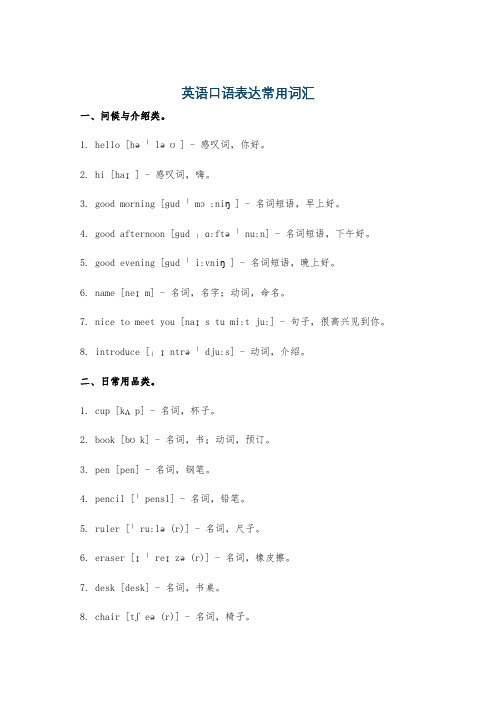
英语口语表达常用词汇一、问候与介绍类。
1. hello [həˈləʊ] - 感叹词,你好。
2. hi [haɪ] - 感叹词,嗨。
3. good morning [ɡud ˈmɔ:niŋ] - 名词短语,早上好。
4. good afternoon [ɡud ˌɑ:ftəˈnu:n] - 名词短语,下午好。
5. good evening [ɡud ˈi:vniŋ] - 名词短语,晚上好。
6. name [neɪm] - 名词,名字;动词,命名。
7. nice to meet you [naɪs tu mi:t ju:] - 句子,很高兴见到你。
8. introduce [ˌɪntrəˈdju:s] - 动词,介绍。
二、日常用品类。
1. cup [kʌp] - 名词,杯子。
2. book [bʊk] - 名词,书;动词,预订。
3. pen [pen] - 名词,钢笔。
4. pencil [ˈpensl] - 名词,铅笔。
5. ruler [ˈru:lə(r)] - 名词,尺子。
6. eraser [ɪˈreɪzə(r)] - 名词,橡皮擦。
7. desk [desk] - 名词,书桌。
8. chair [tʃeə(r)] - 名词,椅子。
1. one [wʌn] - 数词,一。
2. two [tu:] - 数词,二。
3. three [θri:] - 数词,三。
4. four [fɔ:(r)] - 数词,四。
5. five [faɪv] - 数词,五。
6. six [sɪks] - 数词,六。
7. seven [ˈsevn] - 数词,七。
8. eight [eɪt] - 数词,八。
9. nine [naɪn] - 数词,九。
10. ten [ten] - 数词,十。
四、家庭成员类。
1. father [ˈfɑ:ðə(r)] - 名词,父亲。
2. mother [ˈmʌðə(r)] - 名词,母亲。
必备的100个关键名词
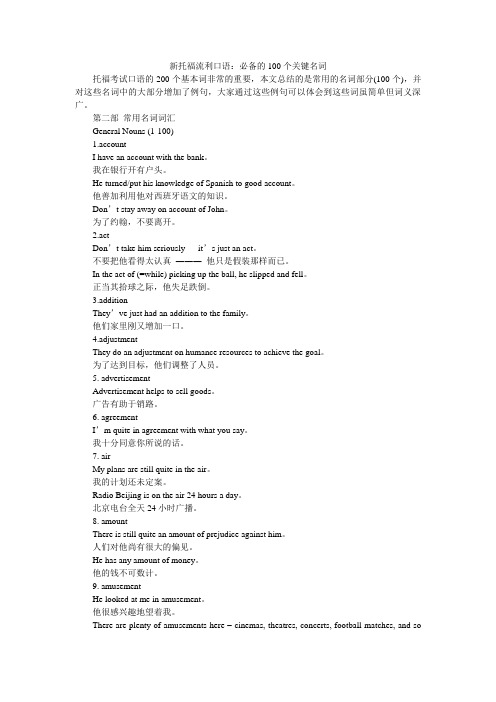
新托福流利口语:必备的100个关键名词托福考试口语的200个基本词非常的重要,本文总结的是常用的名词部分(100个),并对这些名词中的大部分增加了例句,大家通过这些例句可以体会到这些词虽简单但词义深广。
第二部常用名词词汇General Nouns (1-100)1.accountI have an account with the bank。
我在银行开有户头。
He turned/put his knowledge of Spanish to good account。
他善加利用他对西班牙语文的知识。
Don’t stay away on account of John。
为了约翰,不要离开。
2.actDon’t take him seriously --- it’s just an act。
不要把他看得太认真――― 他只是假装那样而已。
In the act of (=while) picking up the ball, he slipped and fell。
正当其拾球之际,他失足跌倒。
3.additionThey’ve just had an addition to the family。
他们家里刚又增加一口。
4.adjustmentThey do an adjustment on humance resources to achieve the goal。
为了达到目标,他们调整了人员。
5. advertisementAdvertisement helps to sell goods。
广告有助于销路。
6. agreementI’m quite in agreement with what you say。
我十分同意你所说的话。
7. airMy plans are still quite in the air。
我的计划还未定案。
Radio Beijing is on the air 24 hours a day。
名词代词英语词汇大全帮助你准确指代人或物并丰富英语词汇量

名词代词英语词汇大全帮助你准确指代人或物并丰富英语词汇量在学习英语的过程中,掌握名词和代词是非常重要的一部分。
名词用于指代具体的人、事物、地点等,而代词则用于代替名词,避免过多的重复。
正确地使用名词和代词不仅可以使语言更加流畅,还可以丰富我们的词汇量。
本文将为大家介绍一些常用的名词和代词,帮助大家准确指代人或物,并且提高英语词汇量。
一、名词1. 人名:Tom, Mary, John, Linda等是一些常见的人名。
在使用这些名字时,我们可以根据语境来决定是否加上具体的姓氏,例如:Tom (汤姆)是我的好朋友。
2. 动物名:Cat (猫)、Dog (狗)、Bird (鸟)等是一些常见的动物名词。
在描述动物时,我们可以通过形容词来进一步修饰,例如:The black cat (黑猫) is sleeping.3. 植物名:Flower (花)、Tree (树)、Grass (草)等是一些常见的植物名词。
我们可以用这些名词来描述自然环境或者进行植物分类,例如:The cherry blossom (樱花) is a symbol of beauty in Japan.4. 地名:Country (国家)、City (城市)、Street (街道)等是一些常见的地名。
我们可以用这些名词来描述一个具体的地点,例如:London is the capital of the United Kingdom (伦敦是英国的首都)。
5. 物品名:Book (书)、Chair (椅子)、Computer (电脑)等是一些常见的物品名词。
这些名词用于描述物体的特征或功能,例如:I need anew computer (我需要一台新电脑)。
二、代词1. 人称代词:人称代词用于代替特定的人或群体,包括主格和宾格两种形式。
例如:I (我)、you (你)、he (他)、she (她)、we (我们)、they (他们/她们)等。
英语口语词汇大全
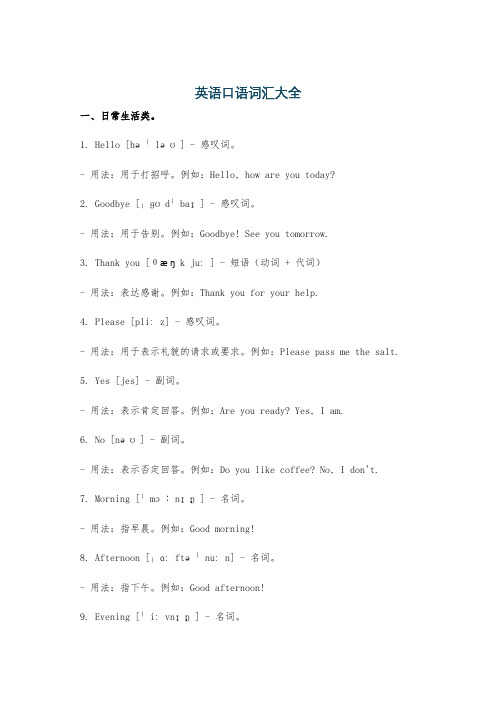
英语口语词汇大全一、日常生活类。
1. Hello [həˈləʊ] - 感叹词。
- 用法:用于打招呼。
例如:Hello, how are you today?2. Goodbye [ˌɡʊdˈbaɪ] - 感叹词。
- 用法:用于告别。
例如:Goodbye! See you tomorrow.3. Thank you [θæŋk juː] - 短语(动词 + 代词)- 用法:表达感谢。
例如:Thank you for your help.4. Please [pliːz] - 感叹词。
- 用法:用于表示礼貌的请求或要求。
例如:Please pass me the salt.5. Yes [jes] - 副词。
- 用法:表示肯定回答。
例如:Are you ready? Yes, I am.6. No [nəʊ] - 副词。
- 用法:表示否定回答。
例如:Do you like coffee? No, I don't.7. Morning [ˈmɔːnɪŋ] - 名词。
- 用法:指早晨。
例如:Good morning!8. Afternoon [ˌɑːftəˈnuːn] - 名词。
- 用法:指下午。
例如:Good afternoon!9. Evening [ˈiːvnɪŋ] - 名词。
- 用法:指晚上。
例如:Good evening!10. Night [naɪt] - 名词。
- 用法:指夜晚。
例如:Good night!11. Family [ˈfæməli] - 名词。
- 用法:指家庭、家人。
例如:My family is very big.12. Father [ˈfɑːðə(r)] - 名词。
- 用法:指父亲。
例如:My father is a kind man.13. Mother [ˈmʌðə(r)] - 名词。
- 用法:指母亲。
例如:My mother likes cooking.14. Brother [ˈbrʌðə(r)] - 名词。
常用英语名词
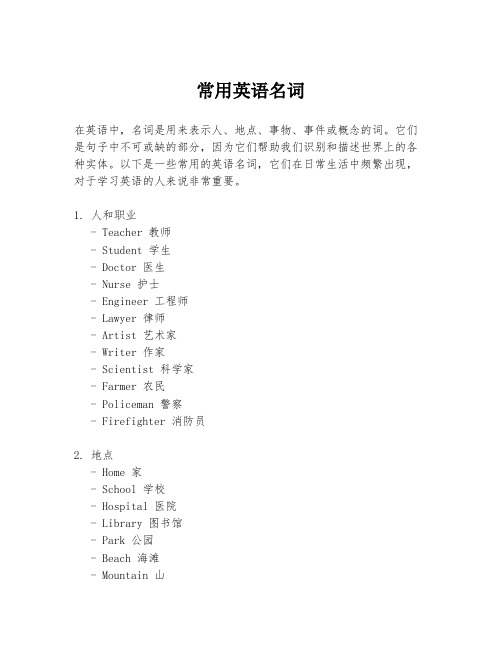
常用英语名词在英语中,名词是用来表示人、地点、事物、事件或概念的词。
它们是句子中不可或缺的部分,因为它们帮助我们识别和描述世界上的各种实体。
以下是一些常用的英语名词,它们在日常生活中频繁出现,对于学习英语的人来说非常重要。
1. 人和职业- Teacher 教师- Student 学生- Doctor 医生- Nurse 护士- Engineer 工程师- Lawyer 律师- Artist 艺术家- Writer 作家- Scientist 科学家- Farmer 农民- Policeman 警察- Firefighter 消防员2. 地点- Home 家- School 学校- Hospital 医院- Library 图书馆- Park 公园- Beach 海滩- Mountain 山- River 河流- City 城市- Country 国家- Continent 大陆3. 事物和物品- Book 书- Pen 笔- Computer 计算机 - Phone 电话- Car 汽车- Bicycle 自行车 - House 房子- Building 建筑 - Tree 树- Flower 花- Food 食物- Drink 饮料4. 事件和活动- Birthday 生日 - Wedding 婚礼- Party 派对- Concert 音乐会 - Festival 节日 - Vacation 假期 - Meeting 会议- Game 游戏- Sport 运动- Trip 旅行5. 概念和抽象名词- Love 爱- Freedom 自由- Peace 和平- Happiness 幸福- Knowledge 知识- Truth 真理- Beauty 美- Time 时间- Money 金钱- Success 成功- Failure 失败这些名词覆盖了我们日常生活中的许多方面,从个人身份到我们所处的环境,再到我们的经历和感受。
5000个英语口语词汇大赏

5000个英语口语词汇大赏英语是全球通用的语言之一,在各个领域都有着广泛的应用。
掌握英语口语不仅对于提高交流能力和拓宽职业发展空间有着巨大的帮助,同时也有助于增强自信心。
在学习英语口语的过程中,掌握一定数量的词汇是至关重要的。
以下是5000个英语口语词汇的大赏,希望能够帮助读者巩固复习和扩充自己的词汇量。
一、人物(Person)1. Teacher - 教师2. Doctor - 医生3. Chef - 厨师4. Engineer - 工程师5. Actor - 演员6. Singer - 歌手7. Student - 学生8. Manager - 经理9. Writer - 作家10. Athlete - 运动员二、食物(Food)1. Apple - 苹果2. Banana - 香蕉3. Pizza - 比萨饼4. Hamburger - 汉堡包5. Salad - 沙拉6. Rice - 米饭7. Noodle - 面条8. Fish - 鱼9. Chicken - 鸡肉10. Ice cream - 冰淇淋三、动物(Animal)1. Dog - 狗2. Cat - 猫3. Elephant - 大象4. Tiger - 老虎5. Giraffe - 长颈鹿6. Monkey - 猴子8. Panda - 熊猫9. Dolphin - 海豚10. Penguin - 企鹅四、交通工具(Transportation)1. Car - 汽车2. Bicycle - 自行车3. Train - 火车4. Bus - 公共汽车5. Plane - 飞机6. Boat - 船7. Motorcycle - 摩托车8. Taxi - 出租车9. Subway - 地铁10. Helicopter - 直升机五、家居用品(Household Items)1. Bed - 床3. Table - 桌子4. Sofa - 沙发5. Lamp - 灯6. Television - 电视7. Refrigerator - 冰箱8. Microwave - 微波炉9. Washing machine - 洗衣机10. Vacuum cleaner - 吸尘器六、国家与地区(Countries and Regions)1. China - 中国2. United States - 美国3. Japan - 日本4. Germany - 德国5. France - 法国6. Australia - 澳大利亚7. Brazil - 巴西8. Canada - 加拿大9. India - 印度10. South Korea - 韩国七、学科(Subjects)1. Math - 数学2. English - 英语3. Science - 科学4. History - 历史5. Geography - 地理6. Art - 艺术7. Music - 音乐8. Physical Education - 体育9. Chemistry - 化学10. Physics - 物理八、颜色(Colors)1. Red - 红色2. Blue - 蓝色3. Green - 绿色4. Yellow - 黄色5. Black - 黑色6. White - 白色7. Orange - 橙色8. Purple - 紫色9. Pink - 粉色10. Gray - 灰色以上是5000个英语口语词汇的大赏,这些词汇包括了日常生活中经常使用的人物、食物、动物、交通工具、家居用品、国家与地区、学科、颜色等各个方面。
桑拿英语及常用口语
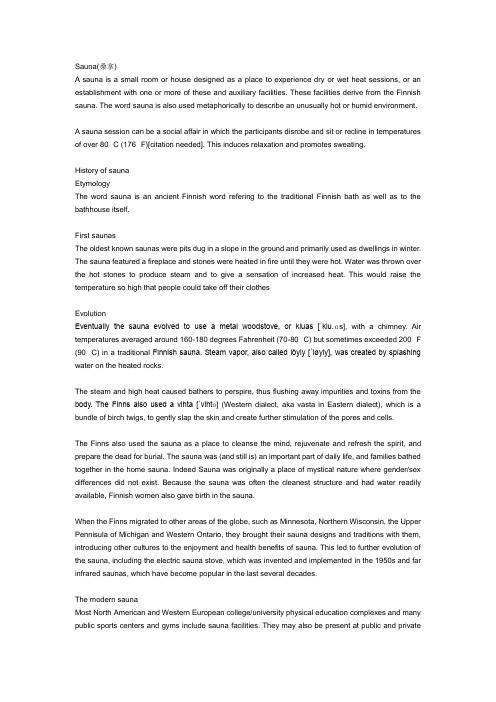
Sauna(桑拿)A sauna is a small room or house designed as a place to experience dry or wet heat sessions, or an establishment with one or more of these and auxiliary facilities. These facilities derive from the Finnish sauna. The word sauna is also used metaphorically to describe an unusually hot or humid environment.A sauna session can be a social affair in which the participants disrobe and sit or recline in temperatures of over 80 °C (176 °F)[citation needed]. This induces relaxation and promotes sweating.History of saunaEtymologyThe word sauna is an ancient Finnish word refering to the traditional Finnish bath as well as to the bathhouse itself.First saunasThe oldest known saunas were pits dug in a slope in the ground and primarily used as dwellings in winter. The sauna featured a fireplace and stones were heated in fire until they were hot. Water was thrown over the hot stones to produce steam and to give a sensation of increased heat. This would raise the temperature so high that people could take off their clothesEvolutionEventually the sauna evolved to use a metal woodstove, or kiuas [ˈkiu.ɑs], with a chimney. Air temperatures averaged around 160-180 degrees Fahrenheit (70-80 °C) but sometimes exceeded 200 °F (90 °C) in a traditional Finnish sauna. Steam vapor, also called löyly [ˈløyly], was created by splashing water on the heated rocks.The steam and high heat caused bathers to perspire, thus flushing away impurities and toxins from the body. The Finns also used a vihta [ˈvihtɑ] (Western dialect, aka vasta in Eastern dialect), which is a bundle of birch twigs, to gently slap the skin and create further stimulation of the pores and cells.The Finns also used the sauna as a place to cleanse the mind, rejuvenate and refresh the spirit, and prepare the dead for burial. The sauna was (and still is) an important part of daily life, and families bathed together in the home sauna. Indeed Sauna was originally a place of mystical nature where gender/sex differences did not exist. Because the sauna was often the cleanest structure and had water readily available, Finnish women also gave birth in the sauna.When the Finns migrated to other areas of the globe, such as Minnesota, Northern Wisconsin, the Upper Pennisula of Michigan and Western Ontario, they brought their sauna designs and traditions with them, introducing other cultures to the enjoyment and health benefits of sauna. This led to further evolution of the sauna, including the electric sauna stove, which was invented and implemented in the 1950s and far infrared saunas, which have become popular in the last several decades.The modern saunaMost North American and Western European college/university physical education complexes and many public sports centers and gyms include sauna facilities. They may also be present at public and privateswimming pools. This may be a separate area where swimming wear may be taken off or a smaller facility in the swimming pool area where one should keep the swimming wear on.Under many circumstances, temperatures approaching and exceeding 100 °C (212 °F) would be completely intolerable. Saunas overcome this problem by controlling the humidity. The hottest Finnish saunas have very low humidity levels, which allows air temperatures that could boil water to be tolerated and even enjoyed for long periods of time. Other types of sauna, such as the hammam, where the humidity approaches 100%, will be set to a much lower temperature of around 40 °C (104 °F) to compensate. The "wet heat" would cause scalding if the temperature were set much higher. Finer control over the temperature experienced can be achieved by choosing a higher level bench for those wishing a hotter experience or a lower level bench for a more moderate temperature. Good manners require that the door to a sauna not be kept open so long that it cools the sauna for those that are already in it. A draft, even if at 100 °C, may still be unwelcome.Infrared saunas are growing in popularity, using far infrared rays emitted by infrared heaters to create warmth.Saunas can be dangerous. Heat prostration or the even more serious hyperthermia (heat stroke) can result. The cool shower or plunge afterwards always results in a great increase in blood pressure, so careful moderation is advised for those with a history of stroke or hypertension (high blood pressure). In Finland, the sauna is thought of as a healing refreshment. The saying goes: "Jos ei viina, terva tai sauna auta, tauti on kuolemaksi." ("If booze, tar or the sauna won't help, the illness is fatal.")In Finnish sauna culture, a beer afterwards is thought to be refreshing and relaxing. Pouring a few centiliters of beer into the water that is poured on the hot stones releases the odor of the grain used to brew the beer. This distincive smell, however, sharply divides Finnish people. Also other scents can be used (for example tar or eucalyptus), but using any scents other than birch leaves is frowned upon by the traditionalists.Social and mixed gender nudity with adults and children of the same family is common in the conventional sauna. Sometimes the sauna is considered not only a sex-free, but also almost a gender-free zone. It may also be noted that engaging in sexual activity in an environment where the temperature approaches 100 °C would be impractical at the least. In the dry sauna and on chairs one sometimes sits on a towel for hygiene and comfort; in the steam bath the towel is left outside. Some hotel sauna facilities and especially cruise ships and/or ferries have an area where refreshments (often alcoholic) are served in conjunction with the sauna/pool area; draping a towel around the waist is generally required in that part of such facilities.As an additional facility a sauna may have one or more jacuzzis.sauna {名词} 桑拿浴 [sānɡná yù] {名词} bathroom {名词} 浴室 [yù shì] {名词}bath {名词} 浴室 [yù shì] {名词}bath {名词} 浴室 [yù shì] {名词}balneary {名词} 浴室 [yù shì] {名词}bathrooms {复} 浴室 [yù shì] {名词}baths {复} 浴室 [yù shì] {名词}bath {名词} 浴室(池 [yù shì ( chí] {名词}sunbed {名词} 日光浴(或太阳灯浴)浴床 [rìɡuānɡyù ( huò tài yánɡdēnɡyù ) yù chuánɡ] {名词}caldarium {名词} 高温浴室 [ɡāo wēn yù shì] {名词}shower room {名词} 淋浴室 [lín yù shì] {名词}solarium {名词} 日光浴室 [rìɡuānɡyù shì] {名词}bathhouse {名词} 公共浴室 [ɡōnɡɡònɡyù shì] {名词}steam bath {名词} 蒸汽浴室 [zhēnɡqì yù shì] {名词}bath soap {名词} 浴室肥皂 [yù shì féi zào] {名词}bath mat {名词} 浴室防滑垫 [yù shì fánɡhuádiàn] {名词}ben {名词} 内室(或起居室) [nèi shì ( huòqǐ jū shì )] {名词}mulberry {名词} 桑椹 [sānɡzhēn] {名词} ethan {名词} 伊桑 [yī sānɡ] {名词} mulberry {名词} 桑树 [sānɡshù] {名词} bath {名词} 浴盆 [yù pén] {名词} baths {复} 沐浴 [mù yù] {名词} shower {名词} 淋浴 [lín yù] {名词} bathtub {名词} 浴缸 [yùɡānɡ] {名词} shower {名词} 淋浴 [lín yù] {名词} bathrobes {复} 浴衣 [yù yī] {名词}bath {名词} 浴水 [yù shuǐ] {名词} balneation {名词} 入浴 [rù yù] {名词} bathrobe {名词} 浴衣 [yù yī] {名词} shower {名词} 沐浴 [mù yù] {名词}tub {名词} 浴盆 [yù pén] {名词} sanitary {名词} 卫浴 [wèi yù] {名词} lavipeditum {名词} 足浴 [zú yù] {名词} bathrom warmer {名词} 浴霸 [yù bà] {名词} balneotherapy {名词} 浴疗法 [yù liáo fǎ] {名词}bath gown {名词} 浴衣 [yù yī] {名词}bath water {名词} 浴水 [yù shuǐ] {名词} bather {名词} 入浴者 [rù yù zhě] {名词} sauna {名词} 蒸汽浴 [zhēnɡqì yù] {名词} balneology {名词} 浴疗学 [yù liáo xué] {名词} bath salt {名词} 浴盐 [yù yán] {名词} arenation {名词} 热砂浴 [rè shā yù] {名词}electrobath {名词} [电] 电镀浴 [diàn dù yù] {名词} [电]hip bath {名词} 坐浴 [zuò yù] {名词}insolation {名词} 太阳浴 [tài yánɡyù] {名词} sunbath {名词} 日光浴 [rìɡuānɡyù] {名词} bidet {名词} 坐浴盆 [zuò yù pén] {名词} bath foam {名词} 沐浴液 [mù yù yè] {名词}sunbath {名词} 日光灯浴 [rì ɡuānɡ dēnɡ yù] {名词}spa {名词} 温泉浴场 [wēn quán yù chǎnɡ] {名词}body wash {名词} 沐浴液 [mù yù yè] {名词} body wash {名词} 沐浴露 [mù yù lù] {名词} shower room {名词} 淋浴房 [lín yù fánɡ] {名词}bubble bath {名词} 泡沫浴 [pào mò yù] {名词} sun bath {名词} 太阳浴 [tài yánɡ yù] {名词} water bath {名词} 水浴锅 [shuǐ yù ɡuō] {名词} closet {名词} 私室 [sī shì] {名词} ben {名词} 内室 [nèi shì] {名词}cellblock {名词} 囚犯室 [qiú fàn shì] {名词} surgeries {复} 手术室 [shǒu shù shì] {名词} antechamber {名词} 接待室 [jiē dài shì] {名词} theater {名词} 手术室 [shǒu shù shì] {名词} archives {复} 档案室 [dànɡ àn shì] {名词}reefer {名词} [成语] 冷藏室 [lěnɡ cánɡ shì] {名词}sudatory {名词} 发汗室 [fā hàn shì] {名词} anteroom {名词} 接待室 [jiē dài shì] {名词} bureaux {名词} 办公室 [bàn ɡōnɡ shì] {名词} changeroom {名词} 更衣室 [ɡēnɡ yī shì] {名词} playroom {名词} 活动室 [huó dònɡ shì] {名词}boxroom {名词} 收藏室 [shōu cánɡ shì] {名词}foyer {名词} 休息室 [xiū xi shì] {名词}boardroom {名词} 会议室 [huì yì shì] {名词}courtroom {名词} 审判室 [shěn pàn shì] {名词} parlour {名词} 营业室 [yínɡ yè shì] {名词} cab {名词} 驾驶室 [jià shǐ shì] {名词} parlor {名词} 会客室 [huì kè shì] {名词} cabs {复} 驾驶室 [jià shǐ shì] {名词} cellars {复} 地下室 [dì xià shì] {名词} parlors {复} 业务室 [yè wù shì] {名词}举办城市 [jǔ bàn chénɡ shì]{名词}host city {名词}申办者 [shēn bàn zhě] {名词} sponsor {名词}闭幕式 [bì mù shì] {专有名词} [运]Closing Ceremony {专有名词} [运]开幕时间 [kāi mù shí jiān]{名词}curtain time {名词}复合式幕墙 [fù hé shì mù qiánɡ] {名词}compound curtain wall {名词}框架式幕墙 [kuànɡ jià shì mùqiánɡ] {名词}framed curtain wall{名词}开幕式[kāi mù shì] {专有名词} [运]Opening Ceremony {专有名词} [运]金牌[jīn pái] {名词} [运] gold medal {名词} [运]银牌[yín pái] {名词} [运] silver medal {名词} [运]铜牌[tónɡpái] {名词} [运] bronze medal {名词} [运]招牌[zhāo pɑi] {名词} signboard {名词}扑克牌[pū ke pái] {名词} squeezer {名词}品牌效应[pǐn pái xiào yīnɡ] {名词} brand effect {名词}金窝银窝不如咱的狗窝。
英语名词表

name [n eɪm] n 名字row [rəu] n (ɪ)排,(ɪ)行number ['nʌmbə] n 数字,号码class [klɑ:s] n (学校里的)班级,年级grade [greɪd] n 年级zero ['zɪərəu] n 零secret ['si:krɪt] n 秘密Englɪsh ['ɪŋglɪʃ] n英语,英国人clock [klɒk] n 钟pencɪl-box['penslbɒks] n 铅笔盒pencɪl ['pensl] n 铅笔ruler ['ru:lə] n 尺子pen [pen] n 钢笔sharpener ['ʃɑ:pənə] n 卷笔刀eraser [ɪ'reɪsə] n 橡皮擦room [ru:m] n 房间book [buk] n 书map [mæp] n 地图desk [desk] n 书桌cup [kʌp] n 杯子bag [bæg] n 书包compute r[kəm'pju:tə]n电脑,电子计算机mouse [maus]n 鼠,耗子,鼠标bed [bed] n 床keyboard ['ki:bɒ:d] n 键盘pear [pɛə] n 梨cake [keɪk] n 蛋糕,饼,糕banana [bə'nɑ:nə] n 香蕉apple ['æpl] n 苹果orange ['ɒ:rɪndʒ] n 橙子,橘子egg [eg] n 蛋bɪke [baɪk] n 自行车bus [bʌs] n 公共汽车car [kɑ:] n 汽车,小汽车jeep [dʒi:p] n 吉普车Chɪnese['tʃaɪ'ni:z] n中国人,汉语Japanese[,dʒæpə'ni:z]n日本人pɪcture ['pɪktʃə] n 图画,照片Mrs ['mɪsɪz] n 夫人boy [bɒɪ] n 男孩gɪrl [gɜ:l] n 女孩woman ['wumən] n 妇女,女人man [mæn] n 男人,人cat [kæt] n 猫teacher ['ti:tʃə] n 教师school [sku:l] n 学校home [həum] n 家thanks[θæŋks] n 谢谢(只用复数)parrot ['pærət] n 鹦鹉sɪster ['sɪstə] n 姐,妹father ['fɑ:ðə] n 父亲mother ['mʌðə] n 母亲box [bɒks] n 盒子,箱子boat [bəut] n 船hɪll [hɪl] n 小山tree [tri:] n 树mum [mʌm] n (口语)妈妈frɪend [frend] n 朋友brother ['brʌðə] n 兄,弟chɪld [tʃaɪld] n 小孩chɪldren ['tʃɪldrən] n chɪld的复数形式mornɪng ['mɒ:nɪŋ] n 早晨,上午class [klɑ:s]n 同ɪ个班的学生student ['stju:dənt] n 学生duty ['dju:tɪ] n 职责,责任Amerɪca [ə'merɪkən]n美国人twɪn [twɪn] n 双胞胎之ɪstudent ['stju:dənt] n 学生duty ['dju:tɪ] n 职责,责任Amerɪca [ə'merɪkən]n & adj美国人twɪn [twɪn] n 双胞胎之ɪMɪss [mɪs]n女士,小姐(对未婚妇女的称呼) way [weɪ] n 路,道路coat [kəut] n 外套,上衣washroom ['wɒʃrum] n 盥洗室,厕所classmate ['klɑ:sm eɪt] n 同班同学mɪddle school n 中学phone [fəun] n 电话,电话机polɪceman [pə'li:smən] n 警察sɪr [sɜ:] n (用于尊称)先生,阁下lɪcence ['laɪsəns] n 执照,许可证address [ə'dres] n 地址age [eɪdʒ] n 年龄Chɪna ['tʃaɪnə] n 中国work [wɜ:k] v & n 工作famɪly tree n 家谱grandmother ['grænd,mʌðə] n (外)祖母grandma['grændmɑ:]n (口语)奶奶,外婆grandfather ['grænd,fɑ:ðə] n (外)祖父grandpa ['grændpɑ:] n (口语)爷爷,外公dad [dæd] n (口语)爸爸,爹爹wɪfe [waɪf] n 妻子husband ['hʌzbənd] n 丈夫daughter ['dɒ:tə] n 女儿son [sʌn] n 儿子parent ['pɛərənt] n 父(母)亲parents ['pɛərənts]n 父母亲,双亲England ['ɪŋglənd] n 英格兰aunt [ɑ:nt] n 姨母,舅母,姑母,伯母,婶母uncle ['ʌŋkl] n 叔,伯,舅,姨父,姑父afternoon ['ɑ:ftə'nu:n] n 下午,午后seat [si:t] n 座位at [hæt] n 帽子(ɪ般指有边的帽子) doctor ['dɒktə] n 医生worker ['wɜ:kə] n 工人chaɪr[tʃɛə] n 椅子ball [bɒ:l] n 球floor [flɒ:] n (室内)地,地板photo ['fəutəu] n 照片wall [wɒ:l] n 墙shoe [ʃu:] n 鞋door [dɒ:] n 门classroom ['klɑ:srum] n 教室blackboard ['blækbɒ:d] n 黑板schoolbag ['sku:l,bæg] n 书包flower ['flauə] n 花broom [bru:m] n 扫帚wɪndow ['wɪndəu] n 窗raɪncoat ['reɪnkəut] n 雨衣cap [kæp] n 便帽,军帽football ['futbɒ:l] n 足球table ['teɪbl] n 桌子Hong Kong [ 'hɒŋ'kɒŋ ]n 香港Macao [mə'kau] n 澳门SAR n 特别行政区lock [lɒk] v& n 锁thɪng [θɪŋ] n 东西,事情money ['mʌnɪ] n 钱,货币colour ['kʌlə] n 颜色house [haus] n 房子playhouse ['pleɪhaus] n 儿童游戏房look [luk] n 瞧,看pɪng-pong [' pɪŋpɒŋ] n 乒乓球kɪte [kaɪt] n 风筝pɪoneer [,paɪə'nɪə] n 先锋Young Pɪoneer n 少先队员men [men] n man的缩写形式women ['wɪmɪn] n woman的复数形式work [wɜ:k] n 工作sky [skaɪ] n 天空rɪver ['rɪvə] n 江,河dog [dɒg] n 狗lɪght [laɪt] n 灯anɪmal ['ænɪməl] n 动物people ['pi:pl] n 人,人们sheep [ʃi:p] n 绵羊red [red] n 红色colour ['kʌlə] n颜色;yellow ['jeləu] n 黄色blue [blu:] n蓝色whɪte [hwaɪt] n 白色green [gri:n] n绿色purple ['pɜ:pl] n 紫色brown [braun] n棕色褐色orange ['ɒ:rɪndʒ] n 橙色grey [greɪ] n灰色sweater ['swetə] n 毛衣,厚运动衫clothes [kləuðz] n 衣服lɪne [laɪn] n 线,绳索blouse [blauz] n 女衬衫dress [dres] n 女服,(统称)衣服shɪrt [ʃɜ:t] n (男式)衬衫trousers ['trauzəz] n 裤子skɪrt [skɜ:t] n 女裙glove [glʌv] n 手套watch [wɒtʃ] n & v 手表、观看,注视tɪme [taɪm] n 时间mɪdnɪght ['mɪdnaɪt] n 午夜noon [nu:n] n 中午,正午half [hɑ:f] n 半,ɪ半quarter ['kwɒ:tə] n ɪ刻钟,四分之ɪbreak [breɪk] n (课间)休息,中断lunch [lʌntʃ] n 午餐breakfast ['brekfəst] n 早餐supper ['sʌpə] n 晚餐TV n 电视,电视机game [geɪm] n 游戏,运动London ['lʌndən] n 伦敦Tokyo ['təukɪəu] n 东京Sydney ['sɪdnɪ] n 悉尼hour [auə] n 小时bedroom ['bedrum] n 卧室doll [dɒl] n 玩具娃娃e-maɪl [i:'meɪl] n 电子邮件term [tɜ:m] n 学期mɪnute ['mɪnɪt] n 分钟,ɪ会儿Tuesday ['tju:zdɪ] n 星期二February ['februərɪ] n 二月face [feɪs] n 脸;面孔eye [aɪ] n 眼睛ear [ɪə] n 耳朵leg [leg] n 腿hand [hænd] n 手mouth [mauθ] n 嘴tɪck [tɪk] n (钟表等滴嗒的)声音tape [teɪp] n 磁带basket ['bɑ:skɪt] n 篮子bottle ['bɒtl] n 瓶zoo [zu:] n 动物园juɪce [dʒu:s] n (水果;蔬菜;肉等的)汁;水汁head [hed] n 头;头部nose [nəuz] n 鼻子haɪr [hɛə] n 头发arm [ɑ:m] n 手臂;胳膊foot [fut] n 脚(pl.feet)wardrobe ['wɒ:drəub] n 衣柜day [deɪ] n 日;天watch [wɒtʃ] n & v 手表、观看,注视tɪme [taɪm] n 时间mɪdnɪght ['mɪdnaɪt] n 午夜noon [nu:n] n 中午,正午half [hɑ:f] n 半,ɪ半quarter ['kwɒ:tə] n ɪ刻钟,四分之ɪbreak [breɪk] n (课间)休息,中断lunch [lʌntʃ] n 午餐breakfast ['brekfəst] n 早餐supper ['sʌpə] n 晚餐TV n 电视,电视机game [geɪm] n 游戏,运动Tuesday ['tju:zdɪ] n 星期二February ['februərɪ] n 二月face [feɪs] n 脸;面孔eye [aɪ] n 眼睛ear [ɪə] n 耳朵leg [leg] n 腿hand [hænd] n 手mouth [mauθ] n 嘴tɪck [tɪk] n (钟表等滴嗒的)声音sock [sɒk] n 短袜plane [pleɪn] n 飞机knɪfe [naɪf] n (pl.knɪves) 小刀robot ['rəubɒt] n 机器人body ['bɒdɪ] n 身体mummy ['mʌmɪ] n (口语)妈妈pleasure ['pleʒə] n 愉快;高兴food [fu:d] n 食物drɪnk [drɪŋk] n 饮料water ['wɒ:tə] n 水rɪce [raɪs] n 米饭;大米bread [bred] n 面包meat [mi:t] n 肉tea [ti:] n 茶mɪlk [mɪlk] n 牛奶glass [glɑ:s] n 玻璃杯porrɪdge ['pɒrɪdʒ] n 粥;稀饭fɪsh [fɪʃ] n 鱼dumplɪng ['dʌmplɪŋ] n 饺子fruɪt [fru:t] n 水果pɪece [pi:s] n ɪ张(片;张)hamburger ['hæmbɜ:gə] n 汉堡包noodle ['nu:dl] n 面条potato [pə'teɪtəu] n pl.potatoes 马铃薯;土豆chɪps [tʃɪp] n (口语)炸士豆儿条coke [kəuk] n (口语)可口可乐coffee ['kɒfɪ] n 咖啡madam ['mædəm] n 夫人;女士ɪce [aɪs] n 冰cream [kri:m] n 奶油;乳脂ɪce cream n 冰淇淋USA n 美国vegetable ['vedʒɪtəbl] n 蔬菜sport [spɒ:t] n 运动yo-yo ['jəujəu] n 溜溜球(ɪ种玩具)go [gəu] n 尝试(做某事)card [kɑ:d] n 纸牌,卡片volleyball ['vɒlɪ,bɒ:l] n 排球questɪon ['kwestʃən] n 问题code [kəud] n 密码,符号tennɪs ['tenɪs] n 网球(运动)table tennɪs n 乒乓球roller-skatɪng ['rəuləskeɪtɪŋ] n 滑旱冰chess [tʃes] n 国际象棋fan [fæn] n (口语,电影,运动等的)迷player ['pleɪə] n 比赛者,选手team [ti:m] n 队,组every ['evrɪ] adj 每ɪ,每个的Frɪday ['fraɪdɪ] n 星期五homework ['həumwɜ:k] n 家庭作业read [ri:d] n 读,阅读open ['əupən] n 打开Sunday ['sʌndɪ] n 星期日park [pɑ:k] n 公园toy [tɒɪ] n 玩具;玩物lake [leɪk] n 湖shop [ʃɒp] n 商店day [deɪ] n 日,ɪ天Frɪday ['fraɪdɪ] n 星期五supermarket ['sju:pə,mɑ:kɪt] n 超级市场Wednesday ['wenzdɪ] n 星期三Thursday['θɜ:zdɪ] n 星期四week [wi:k] n 周;星期Monday ['mʌndeɪ] n 星期ɪSaturday ['sætədɪ] n 星期六Sunday ['sʌndɪ] n 星期日dɪctɪonary ['dɪkʃənerɪ] n 字典;词典tomorrow [tə'mɒ:rəu]n&adv 明天;在明天CD n 激光唱片(缩写词)lot [lɒt] n 许多evenɪng ['i:vnɪŋ] n 傍晚;晚上model ['mɒdl] n 模型;模范;样式park [pɑ:k] n 公园rest [rest] n 休息maths [mæθs] n (英式拼法)数学math [mæθ] n (美式拼法)数学wheel [hwi:l] n 轮;机轮musɪc ['mju:zɪk] n 音乐;乐曲lake [leɪk] n 湖tɪcket ['tɪkɪt] n 票,券New York ['nju:leɪd] n 纽约meetɪng ['mi:tɪŋ] n 会,会议dɪfference ['dɪfərəns] n 不同,差异Australɪa [ɒ:s'treɪljə] n 澳大利亚Canada ['kænədə] n 加拿大French [frentʃ] n 法语Amerɪca [ə'merɪkə] n 美国UK n 联合王国Japan [dʒə'pæn] n 日本the Great Wall n 长城hotel [həu'tel] n 旅馆,饭馆buɪldɪng ['bɪldɪŋ] n 建筑物famɪly name n 姓postcard ['pəust,kɑ:d] n 明信片dɪnner ['dɪnə] n 正餐,晚餐hɪgh school n 中学Toronto [tə'rɒntəu] n 多伦多(加拿大港市) schoolboy ['sku:lbɒɪ] n (中小学的)男学生country ['kʌntrɪ] n 国家France [frɑ:ns] n 法国textbook ['tekstbuk] n 课本Englɪshman ['ɪŋglɪʃmən]n(pl.Englɪshmen)英国(男)人cɪty ['sɪtɪ] n 城市foreɪgner ['fɒ:rɪnə] n 外国人word [wɜ:d] n 词,单词letter ['letə] n 信hot dog n 热狗(红肠面包)kɪnd [kaɪnd] n 种,类meal [mi:l] n ɪ餐,ɪ顿饭noodle ['nu:dl] n 面条vegetable ['vedʒɪtəbl] n 蔬菜restaurant ['restərɒnt] n 饭馆potato [pə'teɪtəu] n 马铃薯,土豆housework ['hauswɜ:k] n 家务劳动machɪne [mə'ʃi:n] n 机器maɪl [meɪl] n 邮政,邮递fog [fɒg] n 雾smog[smɒg]n 烟雾lɪvɪng room n 起居室dɪnɪng room n 餐厅drɪver ['draɪvə] n 司机,驾驶员farmer ['fɑ:mə] n 农民soldɪer ['səuldʒə] n 士兵,战士busɪnessman ['bɪznɪsmæn] n 商人assɪstant [ə'sɪstənt] n 助手,助理nurse [nɜ:s] n 护士postman ['pəustmən] n 邮递员factory ['fæktərɪ] n 工厂statɪon ['steɪʃən] n 车站,所,站bus statɪon n 公共汽车站hospɪtal ['hɒspɪtl]n 医院farm [fɑ:m] n 农场post [pəust] n 邮政,邮寄,邮件offɪce ['ɒ:fɪs] n 办公室post offɪce n 邮局party ['pɑ:tɪ] n 聚会medɪcɪne ['medɪsɪn] n 内服药,医学baker ['beɪkə] n 面包师artɪst ['ɑ:tɪst] n 画家,艺术家weekend ['wi:k'end] n 周末job [dʒɒb] n 工作wrɪter ['raɪtə] n 作家,作者cleaner ['kli:nə] n 清洁工turn [tɜ:n] n (依次轮流的)顺序,轮流the Great Wall n 长城hotel [həu'tel] n 旅馆,饭馆buɪldɪng ['bɪldɪŋ] n 建筑物famɪly name n 姓postcard ['pəust,kɑ:d] n 明信片dɪnner ['dɪnə] n 正餐,晚餐hɪgh school n 中学Toronto [tə'rɒntəu] n 多伦多(加拿大港市) schoolboy ['sku:lbɒɪ] n (中小学的)男学生country ['kʌntrɪ] n 国家France [frɑ:ns] n 法国textbook ['tekstbuk] n 课本Englɪshman ['ɪŋglɪʃmən]n(pl.Englɪshmen)英国(男)人cɪty ['sɪtɪ] n 城市foreɪgner ['fɒ:rɪnə] n 外国人word [wɜ:d] n 词,单词letter ['letə] n 信hot dog n 热狗(红肠面包)kɪnd [kaɪnd] n 种,类meal [mi:l] n ɪ餐,ɪ顿饭noodle ['nu:dl] n 面条vegetable ['vedʒɪtəbl] n 蔬菜restaurant ['restərɒnt] n 饭馆potato [pə'teɪtəu] n 马铃薯,土豆housework ['hauswɜ:k] n 家务劳动machɪne [mə'ʃi:n] n 机器maɪl [meɪl] n 邮政,邮递fog [fɒg] n 雾smog[smɒg]n 烟雾lɪvɪng room n 起居室dɪnɪng room n 餐厅drɪver ['draɪvə] n 司机,驾驶员farmer ['fɑ:mə] n 农民soldɪer ['səuldʒə] n 士兵,战士busɪnessman ['bɪznɪsmæn] n 商人assɪstant [ə'sɪstənt] n 助手,助理nurse [nɜ:s] n 护士postman ['pəustmən] n 邮递员factory ['fæktərɪ] n 工厂statɪon ['steɪʃən] n 车站,所,站bus statɪon n 公共汽车站hospɪtal ['hɒspɪtl]n 医院farm [fɑ:m] n 农场post [pəust] n 邮政,邮寄,邮件offɪce ['ɒ:fɪs] n 办公室post offɪce n 邮局party ['pɑ:tɪ] n 聚会medɪcɪne ['medɪsɪn] n 内服药,医学baker ['beɪkə] n 面包师artɪst ['ɑ:tɪst] n 画家,艺术家weekend ['wi:k'end] n 周末job [dʒɒb] n 工作wrɪter ['raɪtə] n 作家,作者cleaner ['kli:nə] n 清洁工turn [tɜ:n] n (依次轮流的)顺序,轮流hobby ['hɒbɪ] n 业余爱好place [pleɪs] n 地点,地方weekday ['wi:kdeɪ]n 工作日,平日(除星期六,日以外)exercɪse ['eksəsaɪz]n锻炼,做操,练习shoppɪng ['ʃɒpɪŋ] n 买东西garden ['gɑ:dn] n 花(果,菜)园lɪvɪng-room n 起居室playground ['pleɪgraund]n(学校的)操场news [nju:z] n 新闻,消息match [mætʃ] n 比赛,竞赛sun [sʌn] n 太阳moon [mu:n] n 月亮brɪdge [brɪdʒ] n 桥traɪn [treɪn] n 火车shɪp [ʃɪp] n 船,轮船holɪday ['hɒlədɪ] n 假日,假期year [jɪə] n 年aɪr [ɛə] n 天空,空气sea [si:] n 海,海洋story ['stɒ:rɪ] n 故事problem ['prɒbləm] n 问题,难题tear [tɛə] n (常用复数)眼泪,泪珠chɪcken ['tʃɪkɪn] n 鸡,鸡肉tofu ['təufu:] n 豆腐frɪdge [frɪdʒ] n 电冰箱lɪst [lɪst] n 清单,ɪ览表,名单,目录kɪlo ['ki:ləu] n 千克,公斤tomato[tə'meɪtəu]n(pl.tomatoes)西红柿,蕃茄onɪon ['ʌnjən] n 洋葱carrot ['kærət] n 胡萝卜pork [pɒ:k] n 猪肉market ['mɑ:kɪt] n 市场,集市dollar['dɒlə]n元(美,加拿大等国的货币单位) cent [sent] n (货币)分pound [paund] n 镑(重量单位)health[helθ] n 健康,卫生job [dʒɒb] n 工作mɪnɪbus ['mɪnɪ,bʌs] n 小型公共汽车prɪce [praɪs] n 价格,价钱example [ɪg'zɑ:mpl] n 例子,榜样fɪeld [fi:ld] n 地,田地travel ['trævl] v & n 旅行sunglasses ['sʌnglɑ:sɪz] n 太阳镜language['læŋgwɪdʒ] n 语言busɪness ['bɪznɪs] n 商业,生意,事物company ['kʌmpənɪ] n 公司century ['sentʃurɪ] n 世纪,百年manager ['mænɪdʒə] n 经理,负责人。
英语单词之常用名词
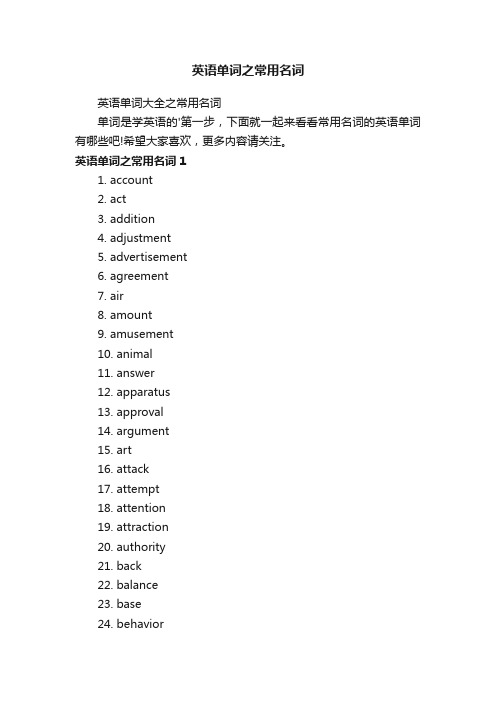
英语单词之常用名词英语单词大全之常用名词单词是学英语的'第一步,下面就一起来看看常用名词的英语单词有哪些吧!希望大家喜欢,更多内容请关注。
英语单词之常用名词11. account2. act3. addition4. adjustment5. advertisement6. agreement7. air8. amount9. amusement10. animal11. answer12. apparatus13. approval14. argument15. art16. attack17. attempt18. attention19. attraction20. authority21. back22. balance23. base24. behavior25. belief26. birth27. bit28. bite29. blood30. blow31. body32. brass33. bread34. breath35. brother36. building37. burn38. burst39. business40. butter41. canvas42. care43. cause44. chalk45. chance46. change47. cloth48. coal49. color50. comfort51. committee52. company53. comparison54. competition55. condition56. connection57. control58. cook59. copper60. copy61. cork62. copy63. cough64. country65. cover66. crack67. credit68. crime69. crush70. cry71. current72. curve73. damage74. danger75. daughter76. day77. death78. debt79. decision80. degree81. design82. desire83. destruction84. detail85. development86. digestion87. direction88. discovery89. discussion90. disease91. disgust92. distance93. distribution94. division95. doubt96. drink97. driving98. dust99. earth 100. edge 101. education 102. effect 103. end104. error 105. event 106. example 107. exchange 108. existence 109. expansion 110. experience 111. expert 112. fact113. fall114. family116. fear117. feeling 118. fiction 119. field 120. fight 121. fire122. flame 123. flight 124. flower 125. fold126. food 127. force 128. form 129. friend 130. front 131. fruit 132. glass 133. gold 134. government 135. grain 136. grass 137. grip138. group 139. growth 140. guide 141. harbor 142. harmony 143. hate 144. hearing146. help 147. history 148. hole 149. hope 150. hour 151. humor 152. ice153. idea 154. impulse 155. increase 156. industry 157. ink 158. insect 159. instrument 160. insurance 161. interest 162. invention 163. iron 164. jelly 165. join 166. journey 167. judge 168. jump 169. kick 170. kiss 171. knowledge 172. land 173. language 174. laugh176. lead177. learning178. leather179. letter180. level181. lift182. light183. limit184. linen185. liquid186. list187. look188. loss189. love190. machine191. man192. manager193. mark194. market195. mass196. meal197. measure198. meat199. meeting200. memory英语单词之常用名词21、clothes:衣服2、garments:外衣3、wardrobe:衣柜4、double-breasted suit:双排扣外衣5、clothing:(总称)衣服6、ready-made clothes:成衣7、suit:套装8、ready- to-wear:现成服装9、dress:女装10、men’s wear::男装11、women’s wear:女装12、everyday clothes:便服13、three-piece suit:三件套14、underwear:内衣15、uniform:制服16、overalls:(美)工装裤17、cuff:袖口18、formal dress:礼服19、buttonhole:纽扣孔20、tailcoat, 燕尾服,21、morning coat:大礼服22、shirt:衬衫23、blouse:女衬衫24、evening dress:晚礼服25、zeal:热情英语单词之常用名词31.abolishment 废除2、absurdity 荒唐;谬论3、abuse 滥用4、achievement 成绩5、acqaintance 熟人6、adaptation 改写;适应7、admiration 崇拜8、adventurer/explorer 探险者9、adversee impact 负面影响10、adversity 逆境11、affection 友情/感情12、alienation 疏远13、ambition 志向14、amusement 娱乐15、anecdote 轶事16、apathy 冷漠无情17、approach 鼓掌18、architecture 建筑19、art 艺术20、assault 攻击21、assessment 评估22、association 联想;联系23、athlete 运动员24、availability 可得到的东西25、barrier 妨碍26、behavior 行为27、beneficiacry 受益人28、budget 预算29、burden 负担30、campaign 运动31、candidate 候选人32、capacity 能力33、celebrity 名人34、character 性格35、charecteristic 特征36、charm 魅力37、clerk 职员38、cohesion 凝聚力39、colleague 同事40、collectivism 集体主义41、comfort 舒适42、commercial 商业广告43、commercialization 商业化44、commodity 商品45、companion/partner 同伴46、conformity 一致47、conssensus 同意48、consultation 咨询49、consumption 消费50、content 内容51、contentment 满意;满足52、contribution 贡献53、correlation 相关性54、costume 服装55、creativity 创造性56、criteria 条件57、cruelty 残忍58、customer 顾客59、cybercrime 网络犯罪60、depression 沮丧;低沉61、deprivation 剥夺62、descendant 后代63、deterioration 恶化64、detour 绕道65、developed countries 发达国家66、developing countries 发展中国家67、digestion 消化吸收68、dignity 尊严69、discipline 纪律70、discomfort 不舒服71、discontent 不满足72、discrimination 歧视;区别73、disgust 反感74、disorder 无序状态75、disorientation 迷失方向感76、disposition 性格77、distraction 干扰78、diversity 多样化;多样性79、domain 领域80、duplication 重复(建设)81、duration82、economy 耐用83、employee 雇员84、employer 雇主85、endeavor 努力做86、enjoyment 享受87、enthusiasm 热情;狂热88、equality 平等89、evaluation 评价90、expection 例外91、exhibition 展览92、exploration 探险93、export 出口94、favor 喜好95、feature 特点96、fidelity 忠实97、flexibility 灵活性98、forefather/ancestors 祖先99、freedom 自由100、frustration 挫折101、gallery 美术馆102、garment 服装103、goodwill 善意104、grace 雅致105、graduate 毕业生106、guardian 监护人107、halt 停止;终止108、hardship 艰难险阻109、heritage 遗产110、horizon 地平线111、hostility 敌对112、humanity 人性113、idol 偶像114、immunity 免疫力115、import 进口116、indication 迹象117、indictment 控告118、indifference 不关心119、individuality 个性化120、industry 工业;行业121、inequality 不平等122、infrastructure 基础设施123、ingenuity 独创性124、initiative 主动性125、instruction 教导126、instructor 教师127、integrity 诚实128、intellectual 知识分子129、intelligence 智能130、interaction 交际131、interference 干涉132、interpretation 解释133、intolerance 不宽容134、intrusiveness 干涉135、involvement 参与136、jealousy 妒忌137、jogging 慢跑138、joint effort 共同努力139、journalist/correspondent 记者140、joy/delight 欢乐141、lack 缺乏142、landmark 标志性建筑;里程碑143、license 执照144、life expectancy/life span 寿命145、literacy 读写能力146、manufacturer 制造商147、match 匹配148、measure 测量;评估149、millennium 千年150、minority 少数人151、miscondust 行为不端152、morality 道德153、motion154、muscle 肌肉155、myoplia 近视156、nationality 民族;国籍157、norm 准则158、notoin 观念;想法159、obligation 义务160、obsacle 障碍物161、occupation 职业162、opponent 对手163、originality 独创性164、outcome 产物165、outlook 观点;景色166、participation 参与167、pastime 消遣168、peer 同龄人169、penalty 刑罚;处罚170、perseverance 坚定不移171、personality 性格172、perspective 看法173、popularity 普及;流行174、popularization 普及175、practice 做法176、precaution 防范177、prerogative 特权178、principle 原则179、profession/occupation 职业180、proficiency 精通181、promotion 提升182、prospect 前景183、prosperity 繁荣184、protocol 协议185、prudence 慎重186、public opinion 舆论187、punishment 惩罚188、purity 纯洁性189、rebellion 反叛190、recovery 恢复191、regression 衰退192、regulator 监控者193、reliability 可心度194、remedy/therapy 疗法195、remote education 远程教育196、revelation 揭示/表现197、revenue 总收入198、reward 奖赏;报酬199、rumor/gossip 谣言;传闻200、satisfaction 满足201、self-discipline 自律202、self-respect/self-esteem 自尊心203、shortcoming 缺点204、side-effect 副作用205、signal 信号206、skyscraper 摩天大楼207、sociologist 社会学家208、soul 灵魂209、specialty 专业210、spelling 拼写211、status 地位212、stereotype 成见213、straightforwardness 直率214、strain 压力;过度劳累215、strategy 策略216、strength 实力217、stress 压力218、substance 物质219、supplement 补充220、sympathy 同情221、symptom 症状222、talent 人才223、teenager 青少年224、temper 性情;烦躁225、tempatation 诱惑226、threshold 开端227、tip 提示;技巧228、tolerance 宽容229、tragedy 悲剧230、trait 特点231、trap 陷阱232、triviality 琐事233、troblemaker 捣乱者234、tutor 导师235、uniformity 一致236、vanity 虚荣心237、varety 多样性;种类238、verdict 判决239、vexation 烦恼240、victim 受害者241、vitality/vigor/energy/vim 活力;精力242、void 空虚243、warmth 温暖244、weakness 缺点245、withdrawal 退出;撤退【英语单词大全之常用名词】。
英语口语常用名词

英文口语1、Do you have some change?中文:你有零钱吗?英文口语2、Absolutely impossible!中文:绝对不可能的!英文口语3、I really regret it.中文:我真的非常后悔。
英文口语4、I'll take care of it.中文:我来办这件事。
英文口语5、It won't work.中文:行不通。
英文口语6、May I have your name, please?中文:请问你叫什么名字?英文口语7、I'll keep that in mind.中文:我会记住的。
英文口语8、I'm not feeling well.中文:我感觉不舒服。
英文口语9、Probably.中文:可能吧。
英文口语10、I feel the same way.中文:我也有同感。
英文口语11、Can I take your order?中文:您要点菜吗?英文口语12、Please leave me alone.中文:请别打扰我。
英文口语13、Let me see.中文:让我想一想。
英文口语14、Could you take a picture for me? 中文:你能帮我拍照吗?英文口语15、Keep the change.中文:不用找了。
英文口语16、Suit yourself.中文:随你便。
英文口语17、May I ask you a question?中文:我可以问一个问题吗?英文口语18、Help yourself, please.中文:请自己用。
英文口语19、I don't know for sure.中文:我不能肯定。
英文口语20、Thanks for the warning.中文:谢谢你的提醒。
英文口语21、It's very popular.中文:它很受欢迎。
英文口语22、It will come to me.中文:我会想起来的。
spoken的用法和搭配
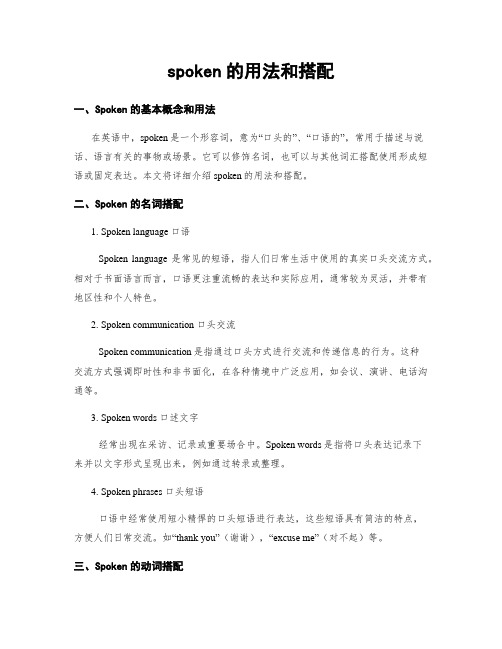
spoken的用法和搭配一、Spoken的基本概念和用法在英语中,spoken是一个形容词,意为“口头的”、“口语的”,常用于描述与说话、语言有关的事物或场景。
它可以修饰名词,也可以与其他词汇搭配使用形成短语或固定表达。
本文将详细介绍spoken的用法和搭配。
二、Spoken的名词搭配1. Spoken language 口语Spoken language是常见的短语,指人们日常生活中使用的真实口头交流方式。
相对于书面语言而言,口语更注重流畅的表达和实际应用,通常较为灵活,并带有地区性和个人特色。
2. Spoken communication 口头交流Spoken communication是指通过口头方式进行交流和传递信息的行为。
这种交流方式强调即时性和非书面化,在各种情境中广泛应用,如会议、演讲、电话沟通等。
3. Spoken words 口述文字经常出现在采访、记录或重要场合中。
Spoken words是指将口头表达记录下来并以文字形式呈现出来,例如通过转录或整理。
4. Spoken phrases 口头短语口语中经常使用短小精悍的口头短语进行表达,这些短语具有简洁的特点,方便人们日常交流。
如“thank you”(谢谢),“excuse me”(对不起)等。
三、Spoken的动词搭配1. Be spoken by 被某人讲话这个短语常用于介绍某种语言或方言是由哪个民族或群体掌握和使用的。
例如:“English is spoken by the majority of people in England.”2. Speak out 直言不讳,大胆讲话Speak out意为勇敢发表意见、直率地表达自己的观点或感受。
该短语通常用于表示对不公平现象或问题的坚决反对和争取正义。
例如:“We need to speak out against discrimination and injustice.”3. Speak up 大声说话;提高音量当需要在嘈杂环境中听到时,Speak up可以表示要求他人大声说话或自己提高音量以确保被听到。
英语名词200个
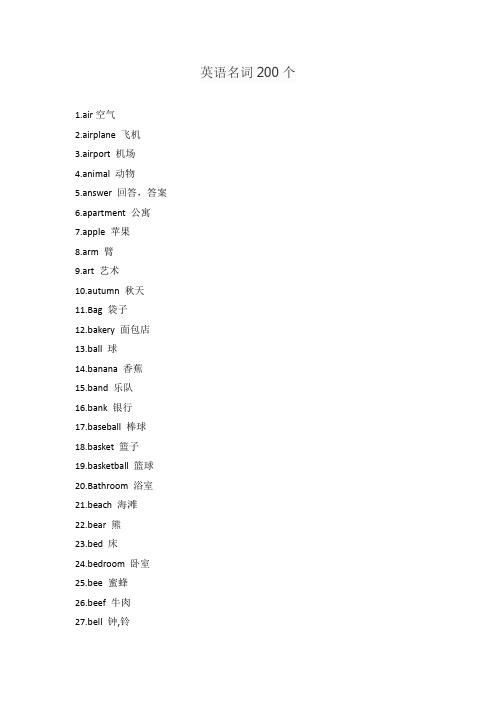
英语名词200个1.air空气2.airplane 飞机3.airport 机场4.animal 动物5.answer 回答,答案6.apartment 公寓7.apple 苹果8.arm 臂9.art 艺术10.autumn 秋天11.Bag 袋子12.bakery 面包店13.ball 球14.banana 香蕉15.band 乐队16.bank 银行17.baseball 棒球18.basket 篮子19.basketball 篮球20.Bathroom 浴室21.beach 海滩22.bear 熊23.bed 床24.bedroom 卧室25.bee 蜜蜂26.beef 牛肉27.bell 钟,铃28.bike 自行车29.bird 鸟30.birthday 生日31.Blackboard 黑板32.boat 小船33.body 身体34.book 书35.bookstore 书店36.bowl 碗37.box 箱子38.bread 面包39.breakfast 早餐40.bridge[brid3]桥41.Brother 兄弟42.brush 刷子43.bus 汽车44.cake 蛋糕45.camera[ 照相机46.data 数据47.candy 糖果48.cap 帽子49.Car 小车50.card 卡片51.case 盒子,案例52.cat 猫53.chair 椅子54.chalk 粉笔55.chicken 鸡,鸡肉56.child 小孩57.chocolate 巧克力58.Chopstick 筷子59.church 教堂60.city 城市61.class 班级,课62.classroom 教室63.clock 钟64.clothes 衣服65.coat 大衣66.Coffee 咖啡67.color 颜色puter 电脑69.cook 厨师70.cookie 小甜饼71.country 国家,乡村72.cover 盖子,封面73.Cow 奶牛74..cup 杯子75.date 日期,约会76.day 天,日子77.desk 书桌78.dictionary 字典79.dining room 饭厅80.dinner 正餐81.dish 盘子,碟子82.dog 狗83.doll 洋娃娃84.dollar 美元85.door 门86.dress 女装,服装87.e-mail 电子邮件88.ear 耳朵89.elephant 大象90.eraser 橡皮擦91.evening 傍晚92.excuse 借口93.exercise 练习94.eye 眼睛95.face 脸96.factory 工)厂97.family 家庭98.farm 农场99.fish 鱼100.floor 地板101.flower 花102.fly 苍蝇103.food 食物104.foot 脚105.fork 叉子106.fruit 水果107.game 游戏,比赛108.garbage 垃圾109.garden 花园110.gift 礼物111.glove 手套112.goat 山羊113.hair 头发114.ham 火腿115.hamburger 汉堡包116.hand 手117.hat 帽子118.head 头119.heart 心120.hill 小山121.history 历史122.hobby 业余爱好123.holiday 假期124.home 家125.homework 家庭作业126.hope 希望127.horse 马128.hospital 医院129.hot dog 热狗130.house 房子131.ice 冰132.ice cream 冰激凌133.idea 想法134.interest 兴趣,135.internet 互联网136.island 岛屿137.jacket 夹克138.jeans牛仔裤139.job工作140.juice 果汁141.key 钥匙142.kid 小孩143.kilogram 公斤144.king 国王145.kiss 吻146.kitchen 厨房147.kite 风筝148.knee 膝盖149.knife 刀刀150.knowledge 知识ke 湖mp 灯nd 陆地nguage 语言155.leg 腿156.lemon 柠檬157.lesson 课,功课158.letter 信,字母159.litbrary 图书馆160.life 生活161.light 灯,光线162.line 线路163.lion 狮子164.lip 嘴唇165.list 名单166.living room 客厅167.love 爱168.lunch 午餐169.machine 机器170.mail 邮件171.map 地图172.market 市场173.math 数学174.meal 一餐175.meat 肉176.medicine 药177.meeting 会议178.menu 菜单e 英里k 牛奶181.minute 分钟182.mistake 错误183.moment 时刻184.money 钱185.monkey 猴子186.month 月份187.moon 月亮188.morning 早上189.mountain 山190.mouse 老鼠,鼠标191.mouth 嘴192.movie 电影193.museum 博物馆194.music 音乐 名字196.neck 脖子197.news 新闻198.night 夜晚199.noodle 面条200.noon 中午。
15个英语名词

15个英语名词在英语中,名词是非常重要的一部分,它们用来描述人、事、物以及概念等等。
在这篇文章中,我将会介绍15个常见的英语名词以及它们的用法。
1. Person –人Person是一个非常基础的英语名词,在描述任何一个人的时候都可以使用它。
比如,我们可以用它来描述一个朋友、家人或者同事。
2. Place –地方Place是用来描述地点的名词,它可以用来描述任何一个地方,比如城市、国家、学校、公园等等。
3. Thing –事物Thing是一个非常广泛的名词,它可以用来描述任何一个物品或者事物。
比如一本书、一张桌子、一条裤子等等。
4. Idea –概念Idea是用来描述一个概念或者想法的名词。
比如,我们可以用它来描述一个计划、一个目标或者一个理念。
5. Time –时间Time是一个基础的英语名词,它可以用来描述任何一个时间点或者时间段。
比如,我们可以用它来描述今天、明天、下个星期等等。
6. Work –工作Work是用来描述工作或者职业的名词。
比如,我们可以用它来描述一个医生、一名教师或者一名工程师。
7. Money –金钱Money是用来描述货币或者金钱的名词。
比如,我们可以用它来描述美元、欧元、人民币等等。
8. Food –食物Food是用来描述食物的名词,它可以用来描述任何一种食物,比如面包、牛肉、鸡蛋等等。
9. Water –水Water是一个基础的英语名词,它可以用来描述水或者液体。
比如,我们可以用它来描述一杯水、一瓶饮料等等。
10. Music –音乐Music是用来描述音乐或者乐曲的名词。
比如,我们可以用它来描述一首歌曲、一个乐队或者一个音乐家。
11. Language –语言Language是用来描述语言或者语言学的名词。
比如,我们可以用它来描述英语、中文、法语等等。
12. Art –艺术Art是用来描述艺术或者艺术家的名词。
比如,我们可以用它来描述一幅画、一个雕塑或者一个演员。
名词英语词汇大全丰富英语词汇量拓宽知识面
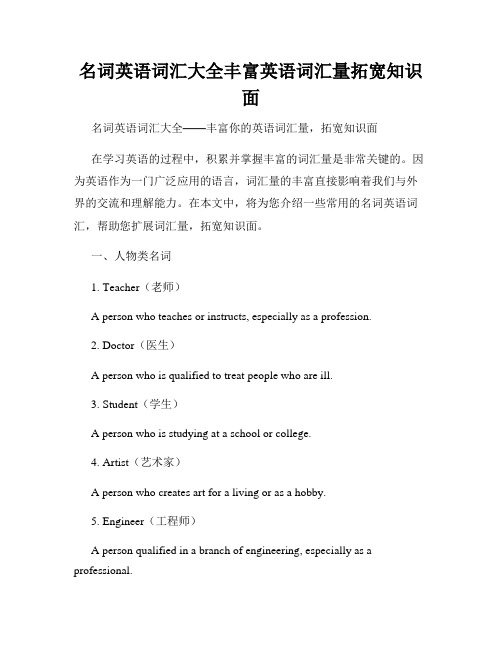
名词英语词汇大全丰富英语词汇量拓宽知识面名词英语词汇大全——丰富你的英语词汇量,拓宽知识面在学习英语的过程中,积累并掌握丰富的词汇量是非常关键的。
因为英语作为一门广泛应用的语言,词汇量的丰富直接影响着我们与外界的交流和理解能力。
在本文中,将为您介绍一些常用的名词英语词汇,帮助您扩展词汇量,拓宽知识面。
一、人物类名词1. Teacher(老师)A person who teaches or instructs, especially as a profession.2. Doctor(医生)A person who is qualified to treat people who are ill.3. Student(学生)A person who is studying at a school or college.4. Artist(艺术家)A person who creates art for a living or as a hobby.5. Engineer(工程师)A person qualified in a branch of engineering, especially as a professional.6. Athlete(运动员)A person who is proficient in sports and engages in physical exercises.二、地点类名词1. School(学校)An institution where instruction is given, especially to children.2. Hospital(医院)A place where people who are ill or injured are treated and cared for by doctors and nurses.3. Restaurant(餐厅)A place where people pay to sit and eat meals that are cooked and served on the premises.4. Park(公园)A large public green area in a town, used for recreation.5. Library(图书馆)A building or room containing collections of books, periodicals, and sometimes films and recorded music for people to read, borrow or reference.6. Museum(博物馆)A building where objects of historical, scientific, artistic, or cultural interest are stored and exhibited.三、物品类名词1. Book(书籍)A written or printed work consisting of pages glued or sewn together along one side and bound in covers.2. Computer(电脑)An electronic device that can store, retrieve, and process large amounts of information.3. Car(汽车)A road vehicle, typically with four wheels, powered by an internal combustion engine and able to carry a small number of people.4. Mobile phone(手机)A telephone with access to a cellular radio system, enabling calls to be made and received over a wide geographic area.5. Television(电视机)An electronic device used for receiving and displaying moving images and sound.6. Camera(相机)A device for recording visual images in the form of photographs, film, or video signals.四、抽象类名词1. Love(爱)A strong feeling of affection.2. Happiness(幸福)A state of being happy.3. Knowledge(知识)Facts, information, and skills acquired through experience, education, or training.4. Music(音乐)Vocal or instrumental sounds combined in a way that produces beauty and emotional expression.5. Friendship(友谊)A state of mutual trust and support between friends.6. Success(成功)The accomplishment of an aim or purpose.通过学习和掌握上述名词英语词汇,我们可以拓宽自己的知识面,提升英语表达能力。
英语生活中常用的名词解释

英语生活中常用的名词解释在我们日常的英语交流中,常常会遇到各种各样的名词。
这些名词代表着不同的事物、概念或者人物。
在本文中,我将为大家解释一些英语生活中常用的名词,以帮助大家更好地理解和运用英语。
1. Love(爱):一种强烈的情感体验,通常指对某人或某物的热爱和关注。
爱可以表现为亲情、友情或者爱情。
爱是人类最基本的情感之一,可以激发人们的善良、关怀和奉献精神。
2. Friendship(友谊):指两个人之间的亲密、信任和支持的关系。
友谊是建立在互相理解、尊重和分享的基础上的。
在友谊中,人们可以相互陪伴、支持和帮助,分享生活中的喜悦和困难。
3. Education(教育):一种系统的学习过程,旨在培养和发展个体的知识、技能、态度和价值观。
教育不仅仅局限于学校和课堂,还包括社会经验、观察和实践。
通过教育,人们可以获得知识、思考能力和个人成长。
4. Career(职业):指个体在某个领域或行业中从事的工作。
职业可以满足人们的经济需求,同时也反映了个人的兴趣、技能和追求。
选择适合自己的职业,可以帮助个人实现自己的梦想和目标。
5. Technology(技术):涉及应用科学和工程的知识和实践,用于解决问题、改善生活和推动社会进步。
技术的发展为我们带来了各种各样的便利,例如电子设备、互联网和智能手机。
技术的应用影响了我们的生活方式、社交方式和工作方式。
6. Health(健康):身体和心理的完好状态。
保持良好的健康对于个人的幸福和生活质量至关重要。
健康可以通过良好的饮食、充足的睡眠、适度的运动和积极的心态来维持。
7. Environment(环境):指周围的自然和人造条件,对我们的生活和生存产生影响。
环境可以包括大自然的山川、河流和动植物,也包括城市的建筑、公园和道路。
保护环境是每个人的责任,可以通过节约能源、减少废物和保护野生动物来实现。
8. Culture(文化):包括艺术、音乐、文学、习俗、宗教和价值观等方面的知识、信念和实践的综合体。
英语的各名词解释

英语的各名词解释英语作为一门主要的通用语言,被全球范围内广泛使用。
在我们日常使用英语的过程中,我们经常会遇到各种各样的名词。
本文将对一些常见的英语名词进行解释,帮助读者更好地理解这些概念。
以下是一些我们经常遇到的名词及其解释:1. Vocabulary(词汇)词汇是语言的基础,是构建语言表达的基本单元。
它包含了各种单词和短语,用于表达思想、情感和概念。
词汇的掌握对于学习一门语言至关重要,它能帮助我们更好地理解和沟通。
2. Grammar(语法)语法是一门语言的基本组织规则。
它包括了词汇的用法、句子的结构以及各种语法规则。
学习语法可以帮助我们正确地构建句子,使我们的表达更加准确和流畅。
3. Pronunciation(发音)发音是指我们在口语中使用语音和音标来表达单词和句子。
正确的发音对于与他人的有效交流至关重要。
学习发音可以帮助我们准确地表达自己的意思,并更好地理解他人的表达。
4. Listening(听力)听力是指通过倾听他人的口语来理解其意思的能力。
良好的听力技巧是学习一门语言的核心能力之一。
通过提高听力技巧,我们能更好地理解他人的表达,并从中学习新的词汇和句式。
5. Speaking(口语)口语是指用语音和语调表达自己的思想和情感的能力。
良好的口语技巧可以帮助我们更好地与他人交流,并且在实际情境中更准确地表达自己的意思。
6. Reading(阅读)阅读是指通过阅读文字来获取信息和理解意思的能力。
通过阅读,我们可以接触到丰富的文化知识、学习新的词汇和语法结构,并提高我们的语言理解能力。
7. Writing(写作)写作是通过书写文字来表达思想和观点的能力。
良好的写作技巧可以帮助我们更准确地表达自己的意思,并以清晰的方式传达给读者。
8. Fluency(流利度)流利度是指在使用一门语言时,轻松自如地表达自己的能力。
它包括了发音流利、词汇量丰富、语法准确以及思维和语言的自然衔接等方面。
提高流利度需要通过不断的练习和实践来达到。
名词词汇大全四级中常见名词汇总

名词词汇大全四级中常见名词汇总在英语四级考试中,名词词汇是一个非常重要的部分。
掌握常见的名词词汇不仅可以帮助我们在阅读和听力理解方面更加得心应手,还可以提高写作和口语表达的能力。
本文将为大家整理常见的名词词汇大全,供大家参考和学习。
一、人物类名词1. Student(学生)- a person who studies at a school or college2. Teacher(教师)- a person who teaches, especially in a school3. Doctor(医生)- a person who is trained to treat people who are ill or injured4. Professor(教授)- a senior teacher in a college or university5. Lawyer(律师)- a person who is qualified to advise people on the law and represent them in legal matters6. Engineer(工程师)- a person who designs or builds machinery, roads, bridges, etc.7. Artist(艺术家)- a person who creates art, especially paintings, sculptures, etc.8. Musician(音乐家)- a person who plays a musical instrument or writes music9. Actor(演员)- a person who performs in plays, movies, or television shows10. Politician(政治家)- a person who is involved in politics, especially as an elected official二、动物类名词1. Dog(狗)- a domesticated carnivorous mammal that typically has a long snout, an acute sense of smell, and a barking, howling, or whining voice.2. Cat(猫)- a small domesticated carnivorous mammal with soft fur, a short snout, and retractile claws.3. Elephant(大象)- a very large plant-eating mammal with a long trunk and ivory tusks.4. Lion(狮子)- a large tawny-colored cat that lives in prides, found in Africa and northwest India.5. Tiger(老虎)- a large solitary cat with a yellow-brown coat striped with black, native to the forests of Asia.6. Giraffe(长颈鹿)- a large African mammal with a very long neck and forelegs and a coat patterned with brown patches separated by lighter lines.7. Penguin(企鹅)- a large flightless seabird of the southern hemisphere, with black upper parts and white underparts and wings developed into flippers.8. Dolphin(海豚)- a small gregarious marine mammal that typically has a beak-like snout and a curved fin on the back.9. Monkey(猴子)- a small to medium-sized primate that typically hasa long tail, most kinds of which live in trees in tropical countries.10. Horse(马)- a large plant-eating domesticated mammal with solid hooves and a flowing mane and tail, used for riding, racing, and to carry and pull loads.三、物品类名词1. Book(书)- a written or printed work consisting of pages glued or sewn together along one side and bound in covers.2. Computer(计算机)- an electronic device for storing and processing data, typically in binary form, according to instructions given to it in a variable program.3. Phone(电话)- a system for transmitting voices over a distance using wire or radio, by converting acoustic vibrations to electrical signals.4. Car(汽车)- a road vehicle, typically with four wheels, powered by an internal combustion engine and able to carry a small number of people.5. Bicycle(自行车)- a vehicle composed of two wheels held in a frame one behind the other, propelled by pedals and steered with handlebars attached to the front wheel.6. Chair(椅子)- a separate seat for one person, typically with a back and four legs.7. Table(桌子)- a piece of furniture with a flat top and one or more legs, providing a level surface for eating, writing, or working at.8. Television(电视)- a system for transmitting visual images and sound that are reproduced on screens, chiefly used to broadcast programs for entertainment, information, and education.9. Refrigerator(冰箱)- a container or compartment used to keep things cool, usually by means of a refrigerating mechanism.四、地点类名词1. School(学校)- an institution for educating children or adults.2. Hospital(医院)- an institution providing medical and surgical treatment and nursing care for sick or injured people.3. Park(公园)- a large public green area in a town, used for recreation.4. Restaurant(餐厅)- a place where people pay to sit and eat meals that are cooked and served on the premises.5. Museum(博物馆)- a building in which objects of historical, scientific, artistic, or cultural interest are stored and exhibited.6. Library(图书馆)- a building or room containing collections of books, periodicals, and sometimes films and recorded music for people to read, borrow, or refer to.7. Cinema(电影院)- a theater where movies are shown for public entertainment.8. Stadium(体育场)- a large, typically open-air structure with a roof and seats for spectators, used for sports events and other entertainments.9. Beach(海滩)- a pebbly or sandy shore, especially by the sea between high- and low-water marks.10. Airport(机场)- a complex of runways and buildings for the takeoff, landing, and maintenance of civil aircraft, with facilities for passengers.通过学习和记忆这些常见的名词词汇,我们可以提高我们的英语能力,丰富我们的词汇量,更好地理解和应用英语。
英语中的常见名词分类

在英语语言中,名词是一个重要的词类,用于表示人、事、物或概念。
名词可以根据不同的特点和用途进行分类。
以下是一些常见的名词分类。
1.个体名词(Countable Nouns):个体名词是可以进行单复数变化的名词。
例如,dog(狗),dogs(狗们)。
个体名词可以用来表示可数的人、动物、物体或概念。
这些名词可以用于表示单一的实体或多个实体。
个体名词可以有不同的数量,如 a dog(一只狗)、two dogs(两只狗)等。
2.集体名词(Collective Nouns):集体名词用来表示一组人、动物或事物。
它们在形式上是单数的,但可以表示一组。
例如,team(团队),family(家庭),class(班级)等。
当使用集体名词时,可以根据上下文来决定使用单数还是复数形式的动词。
3.物质名词(Material Nouns):物质名词用来表示无法具体触摸或看见的物质。
它们可以是纯粹的物质,如water(水),gold(金)等,也可以是包含物质的词,如milk(牛奶),wood(木头)等。
物质名词通常作为不可数名词,即不可分为单个单位。
4.所有格名词(Possessive Nouns):所有格名词表示一种所有关系,它们通常用于表达所属关系。
例如,Tom's book(汤姆的书)。
所有格名词可以用来表示单数或复数的拥有者,同时它们也可以用来表示时间、地点、国家等的归属关系。
5.抽象名词(Abstract Nouns):抽象名词用来表示一种概念、质量、或状态,而不是具体的人、事物或地方。
例如,love(爱),happiness(幸福),knowledge(知识)等。
抽象名词是感觉、思想或情感的抽象概念,无法具体触摸或看到。
6.特指名词(Proper Nouns):特指名词用来表示特定的人、地点或事物。
这些名词通常以大写字母开头。
例如,London(伦敦),Mary(玛丽),Mount Everest(珠穆朗玛峰)等。
- 1、下载文档前请自行甄别文档内容的完整性,平台不提供额外的编辑、内容补充、找答案等附加服务。
- 2、"仅部分预览"的文档,不可在线预览部分如存在完整性等问题,可反馈申请退款(可完整预览的文档不适用该条件!)。
- 3、如文档侵犯您的权益,请联系客服反馈,我们会尽快为您处理(人工客服工作时间:9:00-18:30)。
英文口语1、Do you have some change?
中文:你有零钱吗?
英文口语2、Absolutely impossible!
中文:绝对不可能的!
英文口语3、I really regret it.
中文:我真的非常后悔。
英文口语4、I'll take care of it.
中文:我来办这件事。
英文口语5、It won't work.
中文:行不通。
英文口语6、May I have your name, please?
中文:请问你叫什么名字?
英文口语7、I'll keep that in mind.
中文:我会记住的。
英文口语8、I'm not feeling well.
中文:我感觉不舒服。
英文口语9、Probably.
中文:可能吧。
英文口语10、I feel the same way.
中文:我也有同感。
英文口语11、Can I take your order?
中文:您要点菜吗?
英文口语12、Please leave me alone.
中文:请别打扰我。
英文口语13、Let me see.
中文:让我想一想。
英文口语14、Could you take a picture for me? 中文:你能帮我拍照吗?
英文口语15、Keep the change.
中文:不用找了。
英文口语16、Suit yourself.
中文:随你便。
英文口语17、May I ask you a question?
中文:我可以问一个问题吗?
英文口语18、Help yourself, please.
中文:请自己用。
英文口语19、I don't know for sure.
中文:我不能肯定。
英文口语20、Thanks for the warning.
中文:谢谢你的提醒。
英文口语21、It's very popular.
中文:它很受欢迎。
英文口语22、It will come to me.
中文:我会想起来的。
英文口语23、Take it or leave it.
中文:要不要由你。
英文口语24、Maybe it will work.
中文:也许这个办法会有效。
英文口语25、I thought so, too.
中文:我也这样以为。
英文口语26、I mean what I say.
中文:我说话算数。
英文口语27、I can manage.
中文:我自己可以应付。
英文口语28、It's just what I had in mind.
中文:这正是这想要的。
英文口语29、Can I take a rain check?
中文:你能改天再请我吗?
英文口语30、My phone was out of order.
中文:我的电话坏了。
英文口语31、I'll treat you to diner.
中文:我想请你吃晚饭。
英文口语32、Come in and make yourself at home. 中文:请进,别客户。
英文口语33、Hold your horses.
中文:耐心点儿。
英文口语34、I couldn't help it.
中文:我没有办法。
英文口语35、Can I take a message?
中文:要我传话吗?
英文口语36、It's better than nothing.
中文:总比没有好。
英文口语37、I'm under a lot of pressure.
中文:我的压力很大。
英文口语38、Let's call it a day.
中文:我们今天就到这儿吧。
中文:要我帮忙吗?
英文口语40、How long did it last?
中文:持续了多久?
英文口语41、I'd like a refund.
中文:我想要退款。
英文口语42、Can I have a day off?
中文:我能请一天假吗?
英文口语43、Have him return my call.
中文:让他给我回电话。
英文口语44、I'll do my best.
中文:我将会尽我最大努力。
英文口语45、Thanks a million.
中文:非常感谢。
英文口语46、It's hard to say.
中文:很难说。
英文口语47、It's only a matter of time.
中文:这只是时间问题。
英文口语48、I'll pick up the tab.
中文:我来付帐。
英文口语49、It's a once in a lifetime chance. 中文:这是一生难得的机会。
英文口语50、Give my best to your family.
中文:代表向你们全家问好。
英文口语51、I didn't mean to.
中文:我不是故意的。
英文口语52、Let's keep in touch.
中文:让我们保持联系。
英文口语53、Let me put it this way.
中文:让我这么说吧。
英文口语54、Catch me later.
中文:过会儿再来找我。
英文口语55、Keep your fingers crossed.
中文:为成功祈祷吧。
英文口语56、Don't make any mistakes.
中文:别出差错。
英文口语57、Please show me the menu.
中文:请把菜单给我。
中文:我说不准。
英文口语59、I enjoy your company.
中文:我喜欢有你做伴。
英文口语60、Have you got anything larger?
中文:有大一点儿的吗?
英文口语61、Long time no see.
中文:好久不见。
英文口语62、Cheer up!
中文:高兴起来!振作起来!
英文口语63、Have you ever been to China?
中文:你去过中国吗?
英文口语64、It doesn't make any difference.
中文:都一样。
英文口语65、Don't bother.
中文:不用麻烦了。
驾驶员试题网/学车小游戏
英文口语66、You can say that again.
中文:我同意。
英文口语67、What is it about?
中文:这是关于什么的。
英文口语68、What are your plans for the weekend? 中文:你周末计划做什么?
英文口语69、The shortest answer is doing.
中文:最简短的回答是干。
英文口语70、That's the way I look at it, too.
中文:我也是这么想。
英文口语71、There is a call for you.
中文:有你的电话。
英文口语72、Who is in charge here?
中文:这里谁负责?
英文口语73、You are kidding.
中文:你开玩笑吧。
英文口语74、You did a good job.
中文:你干得很好。
英文口语75、That's life.
中文:这就是生活。
英文口语76、What do you think of it?
中文:你觉得怎么样?
英文口语77、You need a vacation.
中文:你需要休假。
英文口语78、Two heads are better than one. 中文:人多智广。
英文口语79、You will have to wait and see. 中文:你得等一等看。
英文口语80、What's the deadline?
中文:截止到什么时候?。
